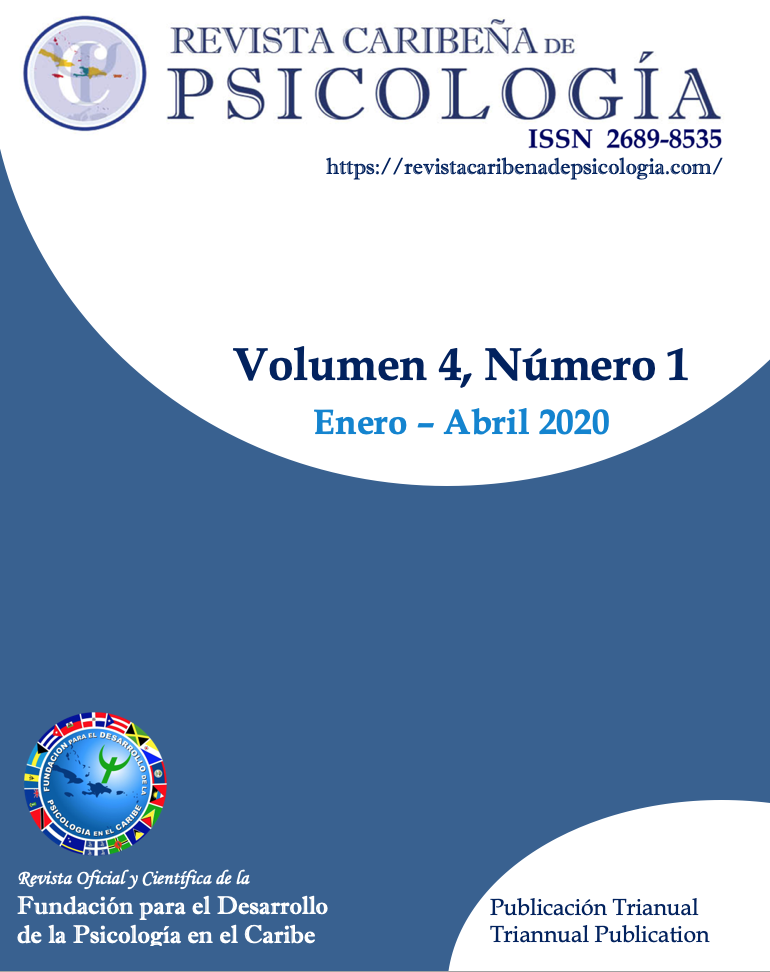Propiedades Psicométricas de la Escala de Pasión Laboral (EPL) en una Muestra de Adultos en Puerto Rico
DOI:
https://doi.org/10.37226/rcp.v4i1.1829Palabras clave:
pasión por el trabajo, modelado de ecuaciones estructurales, psicología positiva, validezResumen
La pasión por el trabajo es un estado de deseo persistente, basado en evaluaciones cognitivas y afectivas hacia el trabajo. La misma ha sido conceptualizada como un constructo bifactorial (pasión armoniosa y pasión obsesiva). El propósito principal de esta investigación fue desarrollar una medida alternativa para la pasión por el trabajo y examinar sus propiedades psicométricas. Para esto, se desarrollaron reactivos basados en la conceptualización teórica del Modelo Dual de la Pasión y se examinó su validez de contenido al igual que sus propiedades psicométricas. Los resultados obtenidos brindaron evidencia de la estructura bifactorial de la Escala de Pasión Laboral y de que ésta posee propiedades psicométricas adecuadas para ser utilizada en investigaciones y diagnósticos organizacionales en Puerto Rico.
Citas
Bagozzi, R. P., & Yi, Y. (1988). On the evaluation of structural equation models. Journal of the Academy of Marketing Science, 16(1), 74-94. https://doi.org/10.1007/BF02723327
Balon, S., Lecoq, J., & Rimé, B. (2013). Passion and personality: Is passionate behaviour a function of personality? European Review of Applied Psychology, 63, 59-65. https://doi.org/10.1016/j.erap.2012.06.001
Birkeland, I. (2015). Obsessive passion for work and organizational citizenship behaviour: A curvilinear investigation. Academy of Management Annual Meeting Proceedings, 1-1. https://doi.org/10.5465/AMBPP.2015.16076
Burke, R., Astakhova, M., & Hang, H. (2015). Work passion through the lens of culture: Harmonious work passion, obsessive work passion, and work outcomes in Russia and China. Journal of Business & Psychology, 30, 457-471. https://doi.org/10.1007/s10869-014-9375-4
Byrne, B. M. (2010). Structural equation modeling with AMOS: Basic concepts, applications, and programming. Psychology Press.
Chamarro, A., Penelo, E., Fornieles, A., Oberst, U., Vallerand, R. J., & Fernandez-Castro, J. (2015). Psychometric properties of the Spanish version of the passion scale. Psicothema, 27(4), 402–409. https://doi.org/10.7334/psicothema2015.80
Champion, D. J. (1981). Basic statistics for social research (2nd ed.). McMillan.
Deci, E. L., & Ryan, R. M. (1985). Intrinsic motivation and self-determination in human behavior. Plenum.
Deci, E. L., Eghrari, H., Patrick, B. C., & Leone, D. R. (1994). Facilitating internalization: The self-determination theory perspective. Journal of Personality, 62(1), 119–142.
Dubreuil, P., Forest, J., & Courcya, F. (2014). From strengths use to work performance: The role of harmonious passion, subjective vitality, and concentration. Journal of Positive Psychology, 9(4), 335-349. https://doi.org/10.1080/17439760.2014.898318
Fernet, C., Lavigne, G., Vallerand, R., & Austin, S. (2014). Fired up with passion: Investigating how job autonomy and passion predict burnout at career start in teachers. Work & Stress, 28, 270-288. https://doi.org/10.1080/02678373.2014.935524
Field, A. (2018). Discovering statistics using IBM SPSS Statistics (5th ed.). Sage.
Forest, J., Mageau, G., Sarrazin, C., & Morin, E. (2011). Work is my passion: The different affective, behavioural, and cognitive consequences of harmonious and obsessive passion toward work. Canadian Journal of Administrative Sciences, 28(1), 17-30. https://doi.org/10.1002/cjas.170
Graves, L. M., Ruderman, M. N., Ohlott, P. J., & Weber, T. J. (2012). Driven to work and enjoyment of work: Effects on managers’ outcomes. Journal of Management, 38, 1655-1680. https://doi.org/10.1177/0149206310363612
Houlfort, N. Philippe, F., Vallerand, R., & Ménard, J. (2014). On passion and heavy work investment: Personal and organizational outcomes. Journal of Managerial Psychology, 29(1), 25-45. https://doi.org/10.1108/JMP-06-2013-0155
Houlfort, N., Philippe, F., Bourdeau, S., & Leduc, C. (2017). A comprehensive understanding of the relationships between passion for work and work–family conflict and the consequences for psychological distress. International Journal of Stress Management. https://doi.org/10.1037/str0000068
Johri, R., Misra, R. K., & Bhattacharjee, S. (2016). Work passion: Construction of reliable and valid measurement scale in the Indian context. Global Business Review, 17(3S), 148S–158S. https://doi.org/10.1177/0972150916631206
Lavigne, G., Forest, J., Fernet, C., & Crevier-Braud, L. (2014). Passion at work and workers’ evaluations of job demands and resources: A longitudinal study. Journal of Applied Social Psychology, 44, 255-265. https://doi.org/10.1111/jasp.12209
Littlewood-Zimmerman, H. F., & Bernal-García, E. R. (2011). Mi primer modelamiento de ecuación estructural: LISREL. Centro de Investigaión en Comportamiento Organizacional (CINCEL).
Montero, I., & León, O. G. (2007). A guide for naming research studies in psychology. International Journal of Clinical and Health Psychology, 7(3), 847-862.
Orgambídez-Ramos, A., Borrego-Alés, Y., & Gonçalves, G. (2014). Passionate workers: A Spanish adaptation of the passion scale. Revista de Psicología del Trabajo y de las Organizaciones, 30(2), 43–48. https://doi.org/10.1016/j. rpto.2014.06.005
Ortega-Santori, C., Martínez-Lugo, M., & Rodríguez-Montalbán, R. (2016). La pasión por el trabajo, ¿vino viejo en botella nueva?: Un análisis psicométrico de la escala de pasión por el trabajo de Vallerand et al. Revista Interamericana de Psicología Ocupacional, 35(2), 68–78. https://doi.org/10.21772/ripo.v35n2a02
Perrewé, P., Hochwarter, W., Ferris, G., McAllister, C., & Harris, J. (2014). Developing a passion for work passion: Future directions on an emerging construct. Journal of Organizational Behaviour, 35(1), 145-150. https://doi.org/10.1002/job.1902
Salessi, S., Omar, A., & Vaamonde, J. D. (2017). Conceptual considerations of work passion. Ciencias Psicológicas, 11(2), 165–178. https://doi.org/10.22235/cp.v11i2.1488
Satorra, A., & Bentler, P. M. (2001). A scaled difference chi-square test statistic for moment structure analysis. Psychometrika, 66(4), 507-514. https://doi.org/10.1007/BF02296192
Schlenker, B. R. (1985). Indentity and self-identification. In B. R. Schlenker (Ed.), The self and social life (pp. 65–99). McGraw-Hill.
Schumacker, R. E., & Lomax, R. G. (2010). A beginner's guide to structural equation modeling (3rd ed.). Erlbaum.
Serrano-Fernández, M. J., Boada-Grau, J., Gil-Ripoll, C., & Vigil-Colet, A. (2017). Spanish adaptation of the passion toward work scale (PTWS). Anales de Psicología, 33(2), 403–410. https://doi.org/10.6018/analesps.33.2.240521
Thorgren, S., Wincent, J., & Sirén, C. (2013). The influence of passion and work-life thoughts on work satisfaction. Human Resource Development Quarterly, 24, 469-492. 24. https://doi.org/10.1002/hrdq.21172
Trepanier, S., Fernet, C., Austin, S., Forest, J., & Vallerand, R. (2014). Linking job demands and resources to burnout and work engagement: Does passion underlie these differential relationships? Motivation & Emotion, 38, 353-366. https://doi.org/10.1007/s11031-013-9384-z
Vallerand, R. (2015). The psychology of passion. A dualistic model. Oxford University Press.
Vallerand, R. J., & Houlfort, N. (2003). Passion at work: Toward a new conceptualization. En S. W. Gilliland, D. Steiner, & D. Skarlicki (Eds.), Emerging perspectives on values in organizations (pp. 175-204). Information Age Publishing.
Vallerand, R. J., Blanchard, C., Mageau, G. a, Koestner, R., Ratelle, C., Leonard, M., & Marsolais, J. (2003). Les passions de l’ame: On obsessive and harmonious passion. Journal of Personality and Social Psychology, 85(4), 756–67. https://doi.org/10.1037/0022-3514.85.4.756
Vallerand, R., Houlfort, N., & Forest, J. (2014). Passion for work: Determinants and outcomes. In M. Gagné (Ed.), The Oxford handbook of work engagement, motivation, and self-determination theory (pp. 85-105). Oxford University Press.
Vallerand, R., Paquet, Y., Philippe, F., & Charest, J. (2010). On the role of passion for work in burnout: A process model. Journal of Personality, 78, 289-312. https://doi.org/10.1111/j.1467-6494.2009.00616.x
Zito, M., & Colombo, L. (2017). The Italian version of the passion for work scale: First psychometric evaluations. Journal of Work and Organizational Psychology, 33, 47–53. https://doi.org/10.1016/j.rpto.2017.01.003







